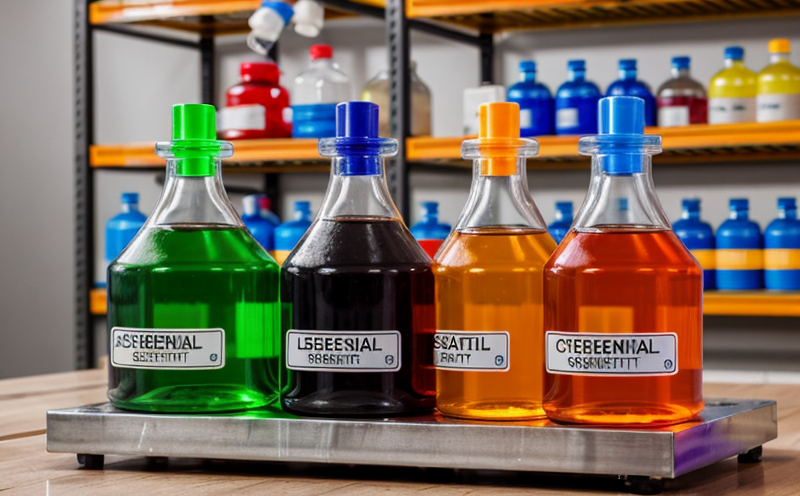Preservative Efficacy and Compliance Testing
In today’s highly regulated market environment, ensuring that consumer products are safe from microbial contamination is paramount. Preservatives play a critical role in extending the shelf life of various consumer goods while maintaining their quality and safety. However, the effective use of preservatives must also comply with stringent international standards to ensure product integrity and consumer safety.
At Eurolab, we specialize in comprehensive preservative efficacy testing (PET) services that go beyond routine checks to provide detailed insights into the performance and compliance status of your products. Our rigorous testing protocols not only help you maintain regulatory compliance but also enhance the reliability and trustworthiness of your product offerings.
Our PET process involves a series of steps designed specifically for different types of consumer goods, ensuring that we can tailor our approach to meet your unique needs. The first step is the selection of appropriate test organisms which are chosen based on the specific risks associated with each product category. For instance, personal care products might require testing against Gram-positive bacteria and fungi, whereas food packaging could necessitate a more extensive range including yeast and mold.
The next phase involves preparing the samples in accordance with industry best practices. This includes ensuring that any necessary dilutions or modifications are made to accurately reflect real-world conditions. Our laboratory adheres strictly to ISO 16642, which provides guidelines for testing preservative efficacy of cosmetic products, and similar standards relevant to other sectors.
Once the samples have been prepared, they undergo a series of exposure periods where varying concentrations of preservatives are applied. These exposures simulate real-world scenarios such as storage conditions or usage patterns. After each exposure period, the samples are evaluated for microbial growth using techniques like plate counts and biochemical tests.
The results from these evaluations provide critical data on how effectively the preservative is working under different conditions. This information can be used to refine formulations, optimize ingredient lists, and ensure long-term stability of products. Compliance with regulations such as FDA’s CFR Part 117 or EU Regulation EC No 2023/65 are key outcomes of this testing.
Our team of experts ensures that all tests are conducted according to the latest methodologies and standards, including those specified in ASTM D4309 or EN 12831 for packaging materials. By leveraging advanced instrumentation such as high-performance liquid chromatography (HPLC), scanning electron microscopy (SEM), and Fourier-transform infrared spectroscopy (FTIR), we can offer precise and reliable results.
Beyond mere compliance, our PET services also help in enhancing brand reputation by demonstrating a commitment to quality and safety. This is especially important given increasing consumer awareness about product safety and sustainability. Our insights into preservative efficacy can guide strategic decisions regarding product development, marketing, and even supply chain management.
Eurolab Advantages
At Eurolab, we pride ourselves on delivering unparalleled service excellence in the field of preservative efficacy testing. Our extensive experience spans multiple industries, including cosmetics, pharmaceuticals, food and beverages, and personal care products, allowing us to provide tailored solutions that meet your specific requirements.
We employ a team of highly qualified professionals who are not only experts in their fields but also stay updated with the latest developments in preservative technology. Our state-of-the-art facilities equipped with cutting-edge equipment ensure accuracy and precision in every test conducted.
Moreover, we offer rapid turnaround times without compromising on quality, ensuring minimal disruption to your product development cycle or supply chain processes. Our commitment to confidentiality ensures that all data remains secure and protected from unauthorized access.
In addition to our core services, Eurolab also provides consultation services aimed at helping clients understand the implications of preservative efficacy testing within broader regulatory frameworks. We offer training sessions to educate staff on best practices related to product safety and compliance.
International Acceptance and Recognition
The importance of international acceptance in product testing cannot be overstated, especially for multinational corporations operating across different regions. At Eurolab, we recognize the significance of aligning our services with global standards to ensure seamless operations worldwide.
We are accredited by reputable bodies such as ISO/IEC 17025:2017 and hold memberships in organizations like ASTM International and IEC. This accreditation guarantees that all our tests meet stringent quality control requirements, thereby enhancing trust among international partners and customers.
Our certification allows us to perform testing according to internationally recognized standards such as ISO 16642 for cosmetics and FDA’s CFR Part 117 for food processing facilities. These certifications are widely accepted across various countries, making it easier for our clients to navigate diverse regulatory landscapes.
We also collaborate closely with local laboratories in different parts of the world to ensure that we can provide localized services wherever needed. This approach helps us stay abreast of regional nuances and requirements, ensuring compliance even when operating in less familiar territories.
Environmental and Sustainability Contributions
In an era where sustainability is increasingly becoming a priority, Eurolab’s preservative efficacy testing goes beyond just meeting regulatory standards. By helping our clients develop safer products with effective preservation methods, we contribute positively to environmental conservation efforts.
The reduction in waste generated by longer shelf lives due to better preservation practices directly benefits the environment. It also promotes resource efficiency by minimizing overproduction and subsequent disposal issues. Effective preservatives can lead to reduced packaging sizes or types, further enhancing sustainability goals.
Moreover, our testing helps identify alternatives that are both effective and environmentally friendly. This includes exploring natural preservatives or low-impact synthetic options that have less impact on ecosystems compared to traditional chemical additives.
By focusing on sustainable practices in product development, we support broader societal goals towards a greener future. Our efforts align with international initiatives like the United Nations Sustainable Development Goals (SDGs), particularly SDG 12 which focuses on responsible consumption and production.





